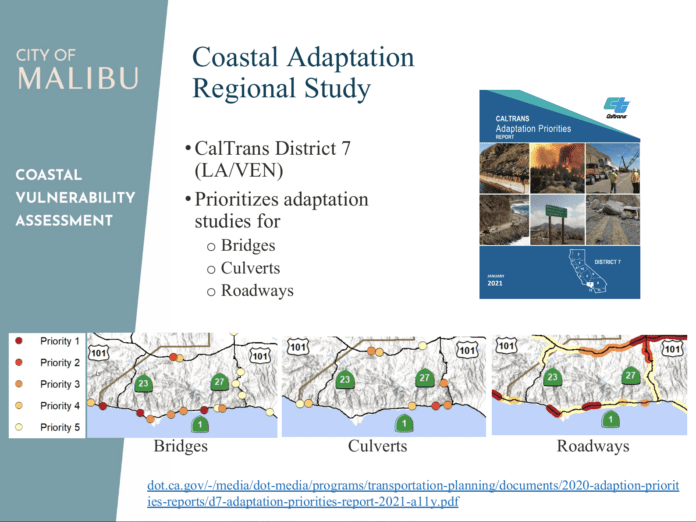Coastal vulnerability discussed; another workshop on Zoom scheduled for Tuesday, April 30
The City of Malibu is taking steps to plan for predicted sea level rise and mitigate potential associated coastal erosion with a Coastal Vulnerability Assessment (CVA) and series of public workshops. Concerned residents and developers attended the second meeting held April 18 at Malibu City Hall. A summary packed with information was presented and then the public was invited to share concerns that will be incorporated into a final report.
A public survey of 76 respondents revealed 67 percent live along Malibu’s coast. A majority of respondents said they enjoyed beach activities such as surfing, walking along the beach, ocean swimming, and wave watching. However, 76 percent said they thought sea level rise and coastal erosion are issues in Malibu and cited loss of sand, increased erosion, rising tides, and wave runup, that they would like to see addressed.
Adaptation measures that could be taken include artificial reefs, submerged rock breakwaters, edging, dredging, revetment, dam removal, and beach dune and lagoon restoration.
The city’s Environmental Sustainability Director Yolanda Bundy reiterated, “A majority of the survey responders have stated that they are seeing changes along Malibu coastline. This is possibly due to sea level rise, coastal erosion, sea water flooding, and other coastal hazards and are interested in what can be done to mitigate the effects of sea level rise.”
Some local areas have been identified by Los Angeles County Department of Beaches and Harbors as possible targets for adaptation measures. Zuma Beach and Point Dume were singled out as coastal areas that could benefit from adaptation plans. Mitigation could include beach nourishment, living shorelines such as dunes and other measures to increase the resilience of the county beaches and public amenities. According to the CVA, Caltrans is also prioritizing sea level rise and climate change adaptation efforts for roadways throughout the state. Caltrans District 7, which covers Malibu, designated high priority for adaptation assessments for several bridges, small culverts, and roadway segments in Malibu for individual adaptation assessments.
Coastal engineer James Jackson of Environmental Science Associates (ESA) addressed the meeting, saying the CVA “evaluates coastal hazards, existing conditions, future sea level rise” including flooding and erosion. It’s predicted that sea level rise will impact critical infrastructure, including wastewater treatment and the Pacific Coast Highway.
ESA predicts 2.5 feet of sea level rise to occur between 2070-75. It gets worse with a projected 6.6 feet rise by 2100-30.
“Sea level rise science is ever-changing and evolving as the scientific community understands and models the effects of sea level rise,” Jackson explained. “These projections are precautionary by design … It’s important for communities to plan ahead.”
Jackson stated low-lying areas are subject to coastal storm flooding and tidal inundation, which makes PCH vulnerable “as you can observe a number of reaches of the highway that are armored with revetment.” He added a sobering prediction: “Beaches in Malibu are primarily narrow under existing conditions. Five percent of the coast has little to no beach in high tides. If sea level rises by 2.5 feet, over 40 percent of the coast could be without a beach and nearly 80 percent of the coast could be without a dry sand beach with 6.6 sea level rise.”
Community input is sought before the Coastal Vulnerability Assessment is finalized.
Another public workshop on Zoom will be held on Tuesday, April 30, at 3 p.m. to provide your feedback and discuss the next steps on the projected impacts of sea level rise. Visit the virtual link to access the meeting. A recording of the first virtual workshop presenting technical results is available at Virtual Workshop Recording. Access the draft Coastal Vulnerability Assessment report, interactive GIS map, and additional information on the Malibu Coastal webpage (malibucity.org/859/Coastal). For inquiries, call (310) 456-2489, ext. 390, or email mbuilding@malibucity.org.

